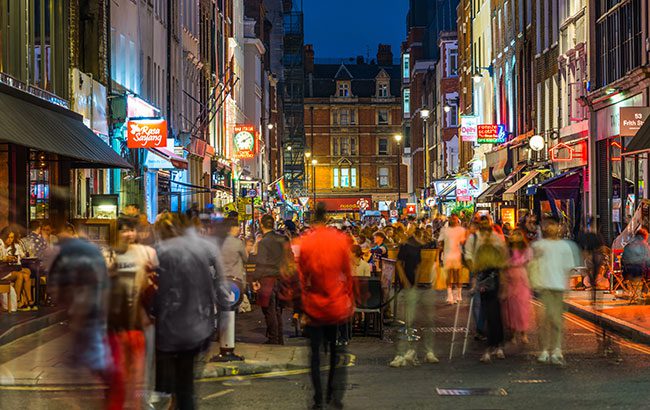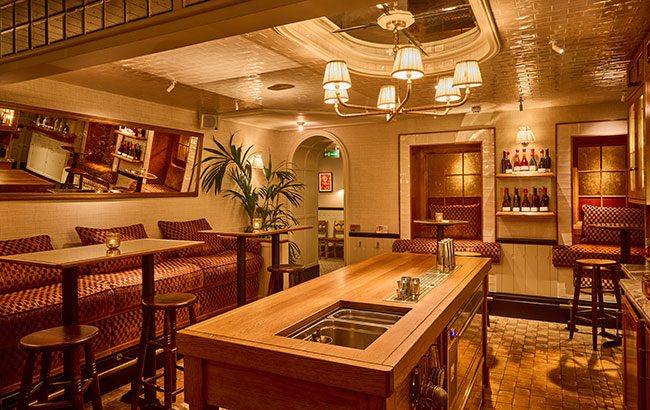What can be done to save London’s nightlife?
The UK capital’s nightlife is in disarray with clubs and bars shutting down, and consumers going home early. SB looks at what can be done to reinvigorate the city when night falls.

*This feature was originally published in the September 2024 issue of The Spirits Business magazine.
This year has been a difficult one for the on-trade. Global spirits volumes in the on-trade fell by 7.6% in the year ending January 2024, according to CGA by NIQ, with other companies citing continued declining sales in specific regions since.
In the UK, accountancy group UHY Hacker Young revealed that pub and bar insolvencies climbed by nearly a third in the year ending 30 April 2024, while the Night Time Industries Association (NTIA) found the nation lost 32 independent night-time economy venues each week between March 2023 and March 2024.
The most high-profile of these closures came early in the year, when the UK’s largest nightlife operator, Rekom UK, called in administrators, ultimately closing 17 venues, splitting from its parent group, and rebranding as Neos Hospitality. But the group hasn’t been the only nightclub casualty of late – London clubs Printworks, and G-A-Y Late both closed in 2023, with The Loop bar and club closing in July 2024.
The causes
The reasons for this disaster are myriad. The Covid-19 pandemic and its lockdowns had an overwhelming effect on an industry that was already in decline, with CGA estimating that one in five nightclubs closed between 2019 and 2022.
But the pandemic’s effect has lasted longer than its restrictions, with consumer behaviour changing dramatically since. CGA’s Cocktail Sales Tracker – which uses data from US venues – found that cocktails are becoming popular on Sundays and earlier in the day.
“The whole consuming style has shifted. People start drinking earlier,” says Angelos Bafas, head of bars at Creative Restaurant Group, which operates London bar Nipperkin. “Our most busy time is between 3pm and 6pm lately – of course, having a restaurant above us helps with that.”
The weekend is also becoming less popular: “Our busiest night is a Thursday – Tuesdays and Thursdays.” It’s similar at the group’s other sites, including Kioku at the Old War Office, which also sees a more traditionally busy Friday night, given its more tourist-friendly location across the river from the London Eye. Bafas also notes that people are generally seeking non-alcoholic drinks more regularly too.
“No-alcohol is about 40% of our revenue,” he explains. “It’s a different game, which is interesting. But I think the main element is we need to shift to be ready for earlier guests.”

But it’s not just changing behaviours that are affecting the on-trade, with Michael Kill, CEO of the NTIA, pointing to the ongoing cost-of-living crisis in the UK. “The economic impacts have been profound, with lower visit frequency, reduced spending, and shorter dwell times due to consumers having less disposable income,” he explains.
“Additionally, transport issues and a lack of confidence in the late-night system and safety are proving to be barriers to the late-night offering.” The infrequency and unreliability of London’s night Tubes are one such transport issue, which is likely to drive consumers to go out earlier – if they come at all.
As solutions, Kill suggests more flexible licensing and planning, which would “allow venues to adjust to new patterns and changing uses”. Financial support in the form of business rates reform and tax relief would also make a huge difference.
The solutions
While this kind of support would be greatly appreciated, venues will have to find ways to survive in the meantime. Adapting to these changing behaviours is key. To address people wishing to socialise earlier, look to radio DJ Annie Mac as an example. Her club night, Before Midnight, launched in 2022, and does exactly what the name suggests – it offers consumers a decent ‘night’ out during the day (when public transport will still be operational).
While a famous face is likely to bring guests in regardless, others are waking up to the opportunity that comes with meeting consumers where (or, rather, when) they are. London club Roxy, in Rathbone Place, hosts Afternoon Party, which runs from 3pm to 8pm, and lets consumers ‘have a great time out and be home for a cheeky takeaway and Netflix by 2100’. At 9pm, the club’s second event begins, meaning there’s something for everyone, regardless of what time they prefer to go out.
Many consumers still love nightlife, which by its very definition happens at night. With nightclubs shutting down, and bars closing increasingly early, many of these people are running out of options. One solution to being able to offer night-time entertainment while remaining profitable is to bolster it with offerings at other times of day, as London’s Stereo, in Covent Garden, has done.
The site opens at 5.30pm, offering bar food and an à la carte menu alongside cocktails and beer on tap. Live music starts at 9pm, with DJs playing from 11.30pm to 3am. Guests can book tickets for specific nights online – many for free – but walk-ins are always welcome.
The latter point is a huge differentiator in the London nightlife scene, which often requires consumers to book tickets weeks or months in advance, removing the option for an impromptu night out. At Stereo, guests can come for an after-work drink, stay for food, and, if the mood takes them, dance until the early hours – all without leaving the building.
Others – sadly – are turning their back on night-time venues altogether. Renowned London club Mahiki closed after 16 years of operation in 2021, with the brand stating it was seeking a new location. It has since put an end to the dream and pivoted to offering “the 360-degree Mahiki experience” including DJs, dance and drinks, at major sporting events, including the Formula One British Grand Prix at Silverstone.
Does London’s nightlife need revamping? Almost certainly. But while on the face of it the sector’s prospects seem somewhat bleak, there are some bright spots of innovation for those willing to search them out.
Related news
BrewDog buyout: 484 jobs lost as 38 bars close
